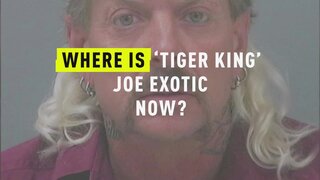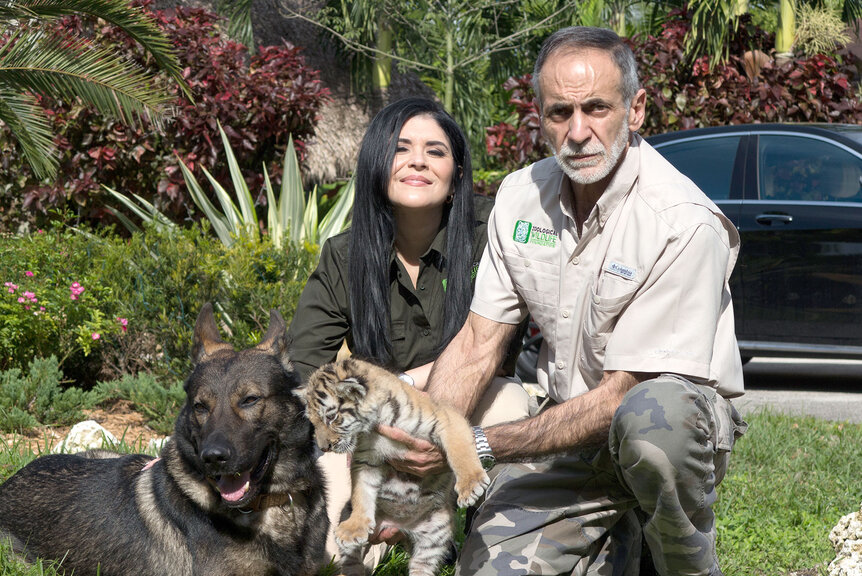Create a free profile to get unlimited access to exclusive videos, breaking news, sweepstakes, and more!
Who Is Former Drug Trafficker Mario Tabraue From Joe Exotic Docuseries And Where Is He Now?
Mario Tabraue was reportedly the inspiration for "Scarface" Tony Montana.

Over the course of five years, filmmakers Eric Goode and Rebecca Chaiklin captured the crazy world of private zookeeping and ownership of large wild cats in the Netflix docuseries "Tiger King: Murder, Mayhem and Madness."
The docuseries mainly tracks the rise and fall of Joe Exotic, a bombastic Oklahoma zookeeper who in January was sentenced to 22 years in prison for hiring a hitman in a murderous plot against a longtime animal rights activist enemy named Carole Baskin.
Exotic was convicted last year on two counts of murder-for-hire, eight counts of violating the Lacey Act for falsifying wildlife records, and nine counts of violating the Endangered Species Act, according to the Department of Justice.
But Exotic is just one of several larger-than-life zookeepers/exotic animal enthusiasts profiled in the documentary. Among the big cat enthusiasts viewers meet is Mario Tabraue, a former drug kingpin who now runs the Zoological Wildlife Foundation in Miami.
The Cuban-American Tabraue's reputation precedes him; he even acknowledges that he is considered by some to be the inspiration for "Scarface" Tony Montana, as originally reported by Mother Jones in 2014.
"The money coming in suitcases to the bank? I did that. But not with a fat guy in a van. It was a Corvette. I did it by myself," Tabraue boldly asserted in the docuseries, referencing a notable scene in the 1983 film directed by Brian De Palma and starring Al Pacino.
In reality, Tabraue and his father Guillermo ran a family drug enterprise for 10 years. To deter suspicion, Tabraue used his exotic animal business "Zoological Imports Unlimited" as a cover, according to the Associated Press.
"I got to a point where I was on the phone saying, 'Mario's Drugstore, specializing in marijuana, cocaine, and quaaludes. Anybody interested come and get it. Including you, Metro-Dade Organized Crime Bureau,'" Tabraue said in the docuseries.
The federal government finally broke up the ring in the late ‘80s in the “Operation Cobra” mission, named after the exotic animal business cover Tabraue used.
“I was arrested in late 1987 for the drugs, 95% marijuana trafficking in the late seventies and very early eighties,” Tabraue confirmed in an email to Oxygen.com.
During the trial, evidence was presented that Tabraue and his co-conspirators engaged in large-scale cocaine and marijuana trafficking over the course of a decade, the Associated Press reported.
The ring also bribed Miami police officers in order to gain legal protection, according to the New York Times. Selected officers allegedly collected, counted, and disbursed drug profits. This was all while the ring smuggled marijuana and cocaine into Louisiana and Florida. Tabraue ended up creating an illicit network worth about $75 million.
The operation became more chaotic when in July 1980, U.S. Bureau of Alcohol, Tobacco, Firearms and Explosives informant Larry Nash was brutally murdered by a member of the ring. Tabraue downplayed his involvement in the murder, although the Miami New Times alleged that he tried to dismember the body with a machete before another member of the ring used a chainsaw.
Tabraue was convicted on 61 counts of racketeering and sentenced to 100 years in prison by the United States District Court. His father pleaded guilty to income-tax charges related to the operation, but his case was declared a mistrial, according to the Associated Press.
Tabraue himself served only 12 years of his sentence after cooperating with federal authorities, the Miami Herald reported.
“I got out late 1999 and aside from a traffic ticket I have never clashed with the law again,” Tabraue told Oxygen.com.
In the docuseries, Tabraue explained that he engaged in drug trafficking to support his growing desire to own exotic animals and that he has never illegally obtained exotic animals.
“My drug involvement never had anything to do with my animals and the passion [I] have for them,” Tabraue told Oxygen.com. “It’s accurate that I said that I sold drugs to keep the animals in the best possible conditions. [But] I have never had any wildlife abuse allegations. Even less charges.”
In a PBS episode of NOVA archived by the Department of Justice, Tabraue explained that he took in 35 hyacinth macaws in 1987 after seeing that the animals “were in real bad shape.”
“Hyacinth macaws were sold to me supposedly legal by Tony Silva. Turned out they were smuggled. Most died,” he told Oxygen.com.
Silva later pleaded guilty to the illegal importation of protected animals and currently works in Miami helping people raise their exotic birds, according to Mother Jones.
Additionally, in 1985, federal agents connected with the US Fish and Wildlife Service confiscated two of his acquired cheetahs.
“I legally purchased two cheetahs from a person who turned out to have taken them on loan from Amanda Blake of the old western [series] ‘Gunsmoke.’ I was in innocent possession of stolen property … I lost the 30K [I] paid for them,” Tabraue explained to Oxygen.com.
After his release from prison, Tabraue met his wife Maria and they connected over their mutual love of animals, according to the Miami Herald. He also transformed Zoological Imports into the Zoological Wildlife Foundation.
Tabraue also noted in the docuseries that he became close with Bhagavan “Doc” Antle following his release from prison.
“Me and Doc have been friends since about 1983. When I got out we did some film work together that helped me financially,” Tabraue explained to Oxygen.com. “We are like family still today.”
Tabraue maintained in the docuseries that regardless of his past, he is committed to the Zoological Wildlife Foundation and the care of all animals.
"We interact with our animals. We give them love and passion,” he said in the docuseries. “If you can't give them the wild that they supposedly deserve, that doesn't exist anymore, you give them as much happiness as you can. And they do get bonded with humans.
As for the docuseries itself, Tabraue admitted to Oxygen.com that he has yet to watch it.
"People have driven me crazy telling me about it or sending videos they took with their phones," he added.
"Tiger King" is available to stream on Netflix.


























